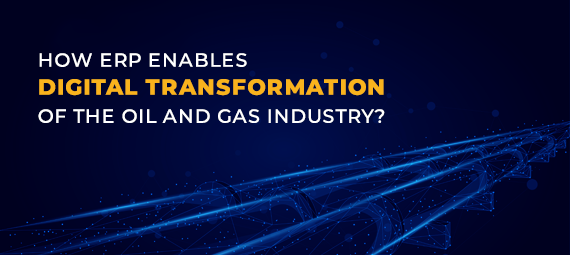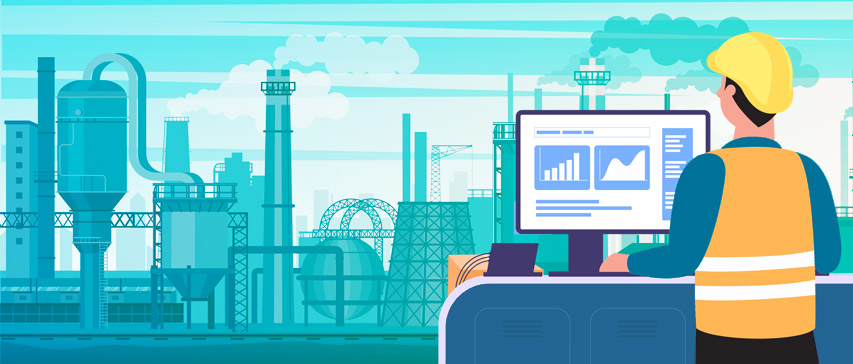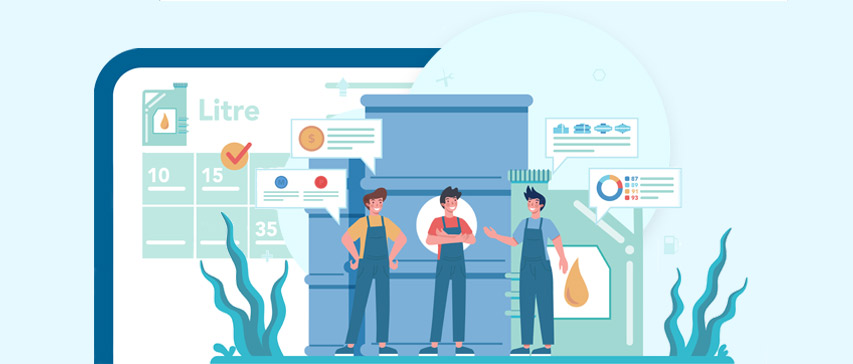
The Oil and Gas industry is a volatile one, susceptible to fluctuations, either due to international gasoline prices or frequent regulatory changes. Additionally, it is constantly faced with unpredictable waves of demand and supply. In an industry such as this, digital technologies, especially ERP systems help gain visibility to crucial processes and gain access to remote areas in the supply chain, providing a bird’s eye view of all processes, operations and recording the availability of resources in real-time.
The digital framework is the crucial link between global operations and supply chain, beginning at the oil well right up to the gas station. There is therefore, an immense potential to achieve efficiency and cut costs through various digital initiatives. However, isolated digital initiatives will not result in large benefits. Oil and Gas companies must have a robust core ERP solution.
The Oil and Gas industry is vast and it’s not possible to generalize the entire industry under one large umbrella. In order to better understand the digital transformation of the oil and gas industry it is important to evaluate the sub-sectors within.

Upstream Oil and Gas Industry
The Upstream Oil and Gas deals with drilling of crude oil and getting the crude oil to refineries. This is an asset-heavy industry and is characterized by operational challenges of extreme and often inhospitable work environments.
Being an asset-heavy and capital intensive industry, companies operating in the upstream Oil and Gas sector need an ERP that can cater to various scenarios of fixed asset management and procurement as well as the accounting treatment which include ensuring the accounts reflects the appropriate book value depending on a variety of depreciation methods.
Secondly, upstream Oil and Gas companies lease assets and therefore should be able to comply with the new lease accounting guidelines provided by IFRS16 and its local variants. An ERP that has the functionality to support these scenarios is critical for the digital transformation of the upstream oil and gas industry.
Several activities in the sector take place on a project basis and these project activities follow a very well-defined “Authorization For Expenditure” or AFE process where every project related cost is tracked against a specific AFE. So, what the companies operating in this sector need is an Oil and Gas ERP system, which provides specific features such as multi-stage budgeting, item and service level planning, budget approval workflows, capitalization of AFE, issuing materials to the wells, managing item conditions and much much more.
These features are vital in ensuring the back-to-back linkage and ensuring that the solution has a robust Project Systems or a Project Management module that allows companies to define and implement these processes. Finally, upstream Oil and Gas companies are adopting emerging technologies and rightly so. When applications, such as those based on IoT that generate continuous data streams, are linked with an existing ERP solution, the benefits that companies derive from such technologies multiples manifolds. This is because the ERP application allows users to view the data in the context of assets or transactional data and design alerts and workflows based on them.

Downstream Oil and Gas Industry
The Downstream Oil and Gas deals with getting the various products and by-products of the crude refining process from the refinery to the end customer. The focus of this part of the Oil and Gas value chain is blending, terminal operations, distribution and retail – each of which require an ERP system that is capable of supporting these processes.
One of the most crucial aspects of the downstream Oil and Gas industry is inventory visibility across the supply chain – from the retail outlets to the terminal. An ERP system that is tailored to support the digital transformation in the downstream Oil and Gas industry, like that of VIENNA Advantage for example, will be able to provide continuous inventory visibility at retail outlets and provide alerts when these levels fall below a threshold.
Distribution is another crucial part of the downstream Oil and Gas industry and an ERP that can support various forms of commodity distribution – whether it’s through pipelines or using another mode of transportation – would be necessary to help businesses get visibility of their distribution network and liaise with transportation service providers to efficiently carry out these tasks.
A downstream Oil and Gas company would require an ERP that can support various terminal activities – these could range anywhere from providing visibility on the terminal inventory, while considering variations in product volumes that depend on ambient temperature, to managing bills of material and recipes for various blending operations. Finally, pricing, billing and managing customer loyalty programs are key processes in any downstream Oil and Gas business and the ERP should be able to support all these processes via a comprehensive pricing module, that allows for companies to perform complex calculations and publish pricing based on several external factors and statutory or taxation requirements.

Manufacturing 4.0 and the Digital Transformation of the Oil and Gas Industry
The Oil and Gas industry is relatively new to the world of digital transformation. Whether the upstream, or the downstream sector, the industry has been under constant pressure to board the digital revolution bandwagon and it’s only recently that they are opening up to emergent technologies in the form of Artificial Intelligence (AI), use of drones, Robotic Process Automation (RPA), Machine, Learning (ML) or Internet of Things (IoT). With the assistance of cutting edge technology, both segments of the industry will be able to benefit.
With regards to upstream operations for example, Oil and Gas organizations can locate reserves in the remotest of places and open up ways to reduce operational costs, while downstream operations can gain real-time visibility into the transportation and distribution channels. These measures are no doubt crucial for any organization especially now when the industry is reeling under the pandemic cloud. COVID-19 has wreaked havoc in the Oil and Gas industry which was already reeling under the pressures of maintaining efficiency, sustainability and profitability.
In the wake of the pandemic and oil prices dropping to an all-time low, organizations have had to turn to their digital assets to stay afloat. There is a growing drive to increase sustainability within the Oil and Gas industry. Combine this with the drive to increase profitability, improve decision-making capabilities and maximize workforce productivity – a robust digital framework embedded with RPA, IoT and ML along with the use of drones becomes an inevitability.
Unlocking the Value of Technology
Most organizations across different industries are migrating to the cloud now and rightly so. In a relentless effort to digitize business, organizations are turning to cloud technologies and moving away from legacy phasing in and out technologies. The manifold benefits of migrating to the cloud include maximizing asset production and democratization of data – making data universally accessible, facilitating a well structured management of business processes – all stemming from the complete digitization of the organization on the cloud.
The Oil and Gas sector however is far from being ideal in the path to complete digitization. In spite of efforts to digitize, the sector at large is lagging behind.
Embracing a new technology is no longer a luxury, it has become the norm. While the Oil and Gas sector has had a slow start, now is the time to act. This is the opportunity for organizations to scale their operations and have an impact on the market. With technology becoming more affordable, all these businesses need is a clear road map that will make the implementation process less cumbersome and more efficient. VIENNA Advantage Cloud ERP provides Oil and Gas companies all this and much more. To learn more about our product and the value it brings your business contact us today.
